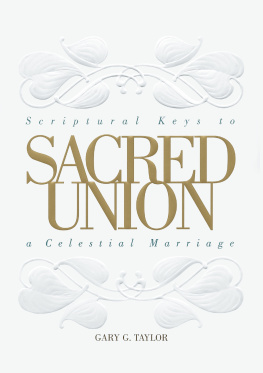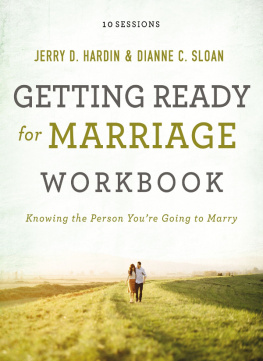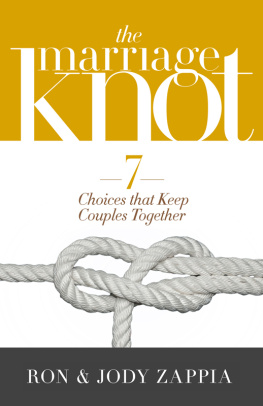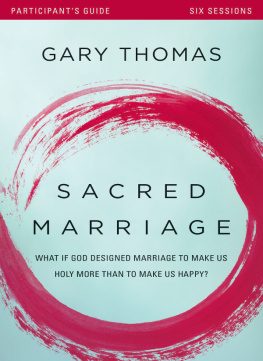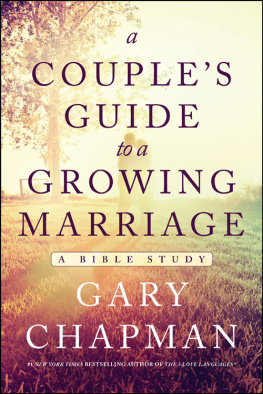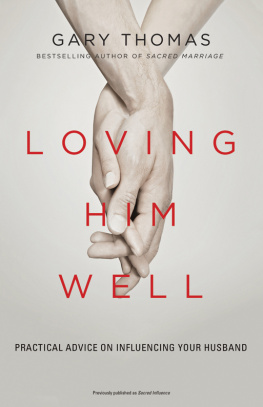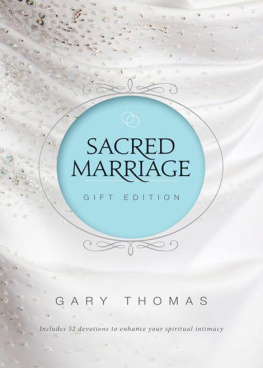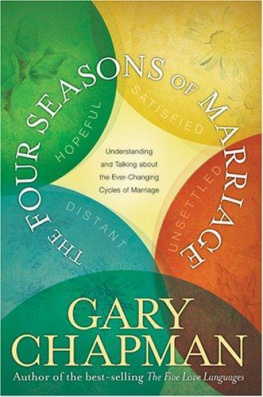Sacred Union
Gary G. Taylor
1999 Gary G. Taylor.
All rights reserved. No part of this book may be reproduced in any form or by any means without permission in writing from the publisher, Deseret Book Company (permissions@deseretbook.com), P.O. Box 30178, Salt Lake City Utah 84130. This work is not an official publication of The Church of Jesus Christ of Latter-day Saints. The views expressed herein are the responsibility of the author and do not necessarily represent the position of the Church or of Deseret Book. Deseret Book is a registered trademark of Deseret Book Company.
Bookcraft is a registered trademark of Deseret Book Company.
Visit us at DeseretBook.com
First printing in hardbound 1999First printing in paperbound 2002
Library of Congress Cataloging-in-Publication Data
Taylor, Gary G.
Sacred union : scriptural keys to a celestial marriage / Gary Taylor.
p. cm.
Includes bibliographical references and index.
ISBN 1-57345-492-3 (hardbound) ISBN-10 1-57008-878-0 (paperbound) ISBN-13 978-1-57008-878-0 (paperbound)
1. MarriagesReligious aspectsChurch of Jesus Christ of Latter-day Saints. 2. Church of Jesus Christ of Latter-day SaintsDoctrines. I. Title.
BX8641.T285 1999
248.8'44dc2199-10514 CIP
Printed in the United States of AmericaAlexanders Print Advantage, Lindon, UT
JIT
To Melody
INTRODUCTION

Recently I had a little time and a television remote control in my hand. Responding to the relentless pressure from my Y chromosome, I began to channel surf, stopping for a time to hear an impassioned plea from an expert on marriage. She strongly advocated laws that would require training before marriage licenses are issued. She made the familiar point that marriage is one of the most complex and difficult ventures we can undertake, yet we allow a couple to marry legally, and even reproduce, without any training at all.
Certainly the institution of marriage has tremendous impact on our individual and collective well- being, particularly if children are a product of the marriage. Yet no training is required. Would we as a society authorize a person to perform brain surgery if we were not convinced of the individuals training and qualifications? Would we grant driving privileges to someone without requiring proof of ability to handle a vehicle safely? Of course not.
Even though passionate and persuasive herself, and even though her assessment of the importance of marriage was accurate, I found myself feeling uneasy about this experts suggestion. For one thing, if the state required certification before marriage, who would do the training and what course material would be used? The marriage expert I was listening to had written several books on the subject and had developed a series of training classes that she thought would fill the bill nicely.
But there seems to be no end to experts on marriage, and books on the subject fill whole sections in libraries. How can we know what the best option is among the many available? Beyond that, is there any good evidence that marriage experts and their various teachings actually improve marriages? Some who provide premarriage training cite studies showing lower divorce rates among their graduates than in the population at large. But these are correlation studies that do not reveal cause and effect. Isnt it likely that those willing to participate in premarriage instruction are the kind of people who are more likely to be successful in marriage, with or without training?
The fact is, as advice on how to be married has proliferated, divorce rates have skyrocketed. Current divorce rates have leveled off somewhat from highs in the 1980s, but they are still twice as high as they were in 1960. And rates in 1960 were awful. Though instruction is undoubtedly helpful in some situations, it appears that the solution must lie somewhere other than in premarital training and self-help books.
No one can deny that marriages too often fail, at great expense to everyone involved; and too many of the marriages that survive are not fulfilling. If marriage experts dont have the complete solution to this significant problem, where do we look? I believe the answer has been here all along. I believe the marriage manual we need exists. Its found in the Bible, the oldest and most frequently published book in history. Its found in other ancient scriptures brought to light by a prophet in our daythe Book of Mormon and the Pearl of Great Price. Its found in the Doctrine and Covenants and other writings and words of current prophets and apostles. The scriptures provide the best marriage manual available; and couples will be the happiest, families the most secure, and society the winner if the precepts taught in scripture are understood and followed.
I expect that most readers will agree with this general premise, and I hope that many readers of this book are well versed in the scriptures. Yet how to make practical application of scriptural directives regarding family relationships is not always understood, or at least not carefully done. As an example, a man I know is a Church member with a long history of comprehensive gospel study. When I first met him, he could quote chapter and verse on any number of subjects. Even so, his marriage was in shambles, and his relationship with his children was abysmal.
This man, whom I will call Matt, was a perfectionist. His favorite scripture seemed to be Matthew 5:48: Be ye therefore perfect. In his interpretation, the directive to be perfect meant things such as have a perfect yard, have impeccable manners, and never waste time. His standards were extremely high, and probably unreasonable, but that wasnt the problem. The problem was the impatient, critical, and even brutal way he reacted to his wife and children when they fell short of his standards. (Incidentally, Matt often fell short too, although he would rarely admit it.)
Several bishops and a marriage counselor had tried valiantly to explain to Matt that he needed to strive to be perfect in tolerance, patience, long-suffering and love, as well as be perfect in carrying out assignments and duties. In fact, the scriptures (1 Corinthians 13:13, for example) point out that charity, the pure love of Christ, is the most important virtue of all. Unfortunately, Matt just didnt get it. He persisted in blaming his wife and children for the problems in his family. In his mind, all would be well if they would simply follow his directives. After all, wasnt he the priesthood leader in the home and didnt he want only the best for his family?
Suggestions from Matts Church leaders and his counselor to back off and be more patient were outrightly rejected. He viewed such advice as softheaded at best. At worst, it was the result of his wifes manipulation of those giving the advice. He thought that her whining had somehow won these advisers over to her view of things. Matts number one job was to get his family to the celestial kingdom, and he was absolutely convinced that they needed to be prodded, not coddled. He was overlooking the fact that no one can be forced to heaven. Righteous goals can be pursued only in righteousness (see D&C 21:3638).
In effect, Matt had heard the word of the Lord, but he wasnt really following it. And, unfortunately, his failure to truly understand and follow Gods marriage manual led to an ugly divorce, resulting in abundant pain and suffering for all involved. His relationship with his children deteriorated to the point that they lost respect for their father. Because of this, not only did he lose his family, he lost the opportunity to influence them, which was, ironically, his primary goal in the first place.

